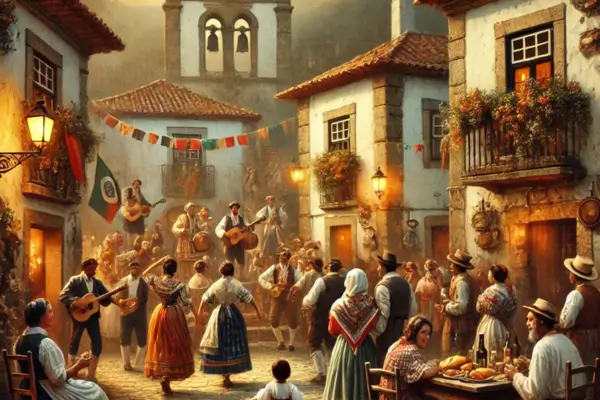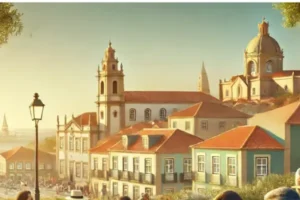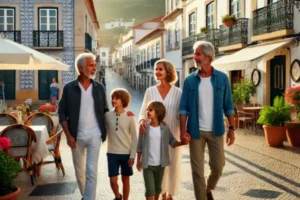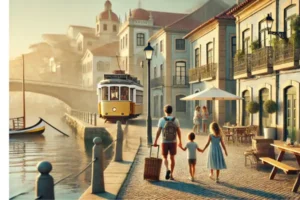Portugal is a treasure trove of cultural richness, where vibrant festivals and heartfelt traditions come alive in every corner of the country. From the lively streets of Porto during São João to the serene charm of Christmas markets, these celebrations are more than just dates on the calendar—they’re an invitation to experience Portugal’s soul, and they’re perfect for creating cherished family memories.
For expatriates moving to Portugal, festivals offer more than entertainment; they’re a gateway to understanding the community and feeling at home. Immersing your family in these events helps foster a sense of belonging while giving your kids a chance to learn and grow in their new environment.
In this guide, we’ll explore the holidays and festivals that can make your move to Portugal even more special. Whether you’re looking for ways to integrate into local life or simply seeking free or low-cost activities to enjoy as a family, these tips will help you embrace the best of Portuguese culture while keeping things budget-friendly.
Understanding Portugal’s Holiday Calendar
Moving to Portugal means embracing a new rhythm of life, and the country’s holiday calendar plays a big role in shaping it. Portugal celebrates a mix of national and regional holidays that reflect its deep cultural and religious roots. For expat families, knowing when these holidays fall and how they’re observed can help you better plan your daily life, family activities, and even your budget.
National and Regional Holidays: What to Expect
- National Holidays: These are celebrated across the country and include major dates like Portugal Day (June 10), commemorating the nation’s rich history and culture, and All Saints’ Day (November 1), a solemn occasion often marked by visiting cemeteries and remembering loved ones. These days often mean businesses and schools are closed, so planning ahead is crucial.
- Regional Holidays: Some holidays are unique to specific regions, such as the St. John’s Festival in Porto (June 23-24), where the streets come alive with music, fireworks, and family-friendly activities. If you live near these areas, they’re worth exploring as a family to soak up the local vibe.
Public vs. Private Sector Holiday Differences
- In Portugal, public sector workers often enjoy additional holidays or reduced working hours around major dates, while private sector employees may not always get the same perks. This means some businesses, especially smaller ones, might stay open even on holidays, but public services like schools, banks, and government offices will close.
- Understanding these differences can help you plan for potential disruptions. For example, avoid errands like doctor’s appointments or government paperwork during holiday weeks to save yourself from frustration.
Planning Family Activities Around Holidays
- Take advantage of long weekends: Portugal has several holidays that fall on Thursdays or Tuesdays, creating opportunities for “pontes” (bridge days) where many people take an extra day off to extend the break. Use these moments to plan local family trips, explore quieter beaches, or enjoy nearby countryside spots.
- Local festivities for free fun: Many towns host free parades, concerts, and fairs during holidays. These are perfect for families looking for budget-friendly activities while experiencing Portuguese culture.
- Prepare for closures: Stock up on essentials like groceries ahead of holidays, especially during longer breaks like Easter or Christmas, when shops may have reduced hours or close entirely.
By understanding Portugal’s holiday calendar, you’ll not only avoid unnecessary inconveniences but also discover new opportunities to connect with local traditions. Whether it’s planning a picnic on Portugal Day or joining a regional festival, these moments are a chance to immerse your family in the rhythm of Portuguese life.
Top Family-Friendly Festivals in Portugal
Portugal is a land of vibrant festivals that celebrate its rich heritage, making it an ideal destination for families to immerse themselves in culture and fun. Whether you’re looking for colorful parades, local delicacies, or magical holiday experiences, there’s something for everyone. Here’s a guide to some of the most family-friendly festivals you can enjoy with your kids.
Carnival (February/March)
Portugal’s Carnival is a burst of color, music, and joy, making it an unforgettable experience for families.
- Where to Go: The Carnival in Loulé (Algarve) is especially family-friendly, with its lively parades, giant floats, and samba-inspired music that isn’t too overwhelming for kids. Another fantastic option is the Madeira Carnival, where families can enjoy street parties and a playful atmosphere in a smaller, more manageable setting.
- What Kids Will Love: The costumes, music, and interactive activities often available at these events, such as workshops or face painting, are perfect for keeping children entertained.
Festas de São João (June)
The São João Festival in Porto is one of Portugal’s most iconic celebrations, combining deep-rooted traditions with a sense of fun that families can enjoy together.
- What to Expect: Streets fill with music, dancing, and colorful decorations, and the night culminates in breathtaking fireworks along the Douro River. One of the quirkiest traditions is the playful tapping of people’s heads with plastic hammers, which kids often find hilarious.
- Family-Friendly Tip: Head to earlier events during the day, like riverfront markets or smaller parades, to avoid the late-night crowds while still soaking in the atmosphere.
Christmas Markets (December)
Portugal’s Christmas markets transform cities into winter wonderlands, making them perfect for a magical family outing.
- Where to Go: Lisbon’s Wonderland Lisboa in Parque Eduardo VII offers ice skating, a Ferris wheel, and festive booths selling treats and crafts.
- What Kids Will Love: Visits to Santa’s grotto, warm churros, and carousels are highlights, along with sparkling lights that create a festive ambiance.
Unique Festivals You Shouldn’t Miss
Portugal also boasts lesser-known festivals that offer a mix of local charm and family appeal:
- Feast of St. Anthony (Lisbon, June): Known as the “matchmaking saint,” this festival features parades, live music, and sardine barbecues. Families can enjoy daytime festivities with a focus on food and culture before the bigger evening parties begin.
- Algarve’s Seafood Festival (August): Perfect for food-loving families, this festival in Olhão combines delicious seafood dishes with live entertainment and kids’ activities.
Making Memories as a Family
Portugal’s festivals are not just about the celebration—they’re a gateway to understanding the local culture and creating cherished memories with your loved ones. Whether you’re dancing at Carnival, marveling at fireworks during São João, or exploring a twinkling Christmas market, these moments will bring your family closer to the heart of Portugal.
Practical Tips for Enjoying Festivals with Children
Festivals in Portugal are lively and full of fun, but they can also feel overwhelming if you’re attending with young children. With a little preparation and smart planning, you can make the experience enjoyable for the whole family. Here are some practical tips to help you navigate these cultural celebrations like a pro.
1. Preparation Is Key
- Dress for the Weather: Many festivals in Portugal are outdoors, so dress your family in layers for cooler evenings or bring hats and sunscreen for daytime events in summer.
- Pack Essentials: Snacks, water bottles, and baby wipes are lifesavers during long days out. Don’t forget a lightweight stroller or baby carrier if you’re traveling with toddlers.
- Know the Festival Schedule: Check event programs in advance so you can prioritize family-friendly activities and avoid missing highlights like parades or fireworks.
2. Navigating Crowds with Ease
- Visit at Off-Peak Times: Arrive early in the day, when crowds are smaller, and events are less hectic. This is especially helpful for younger kids who might feel overwhelmed in busy areas.
- Pick Relaxed Spots: Large squares, quieter streets, or areas near the event’s outskirts often provide a less chaotic environment where kids can play or rest without too much noise.
- Have a Meeting Point: Agree on a central location where everyone will meet in case someone gets separated. Older kids can be given a simple way to contact you, like a phone or wristband with your number.
3. Look for Family-Focused Festival Services
- Play Zones and Kids’ Activities: Many festivals, especially larger ones, include designated areas with games, crafts, or rides tailored to children. Research ahead to find out what’s available.
- Rest Areas: Festivals often have shaded spots or seating areas where families can take a break. Bring a blanket or foldable chairs for extra comfort if allowed.
- Food Options: Portuguese festivals are famous for their food stalls, but not all snacks may appeal to kids. Bring backup options like fruit or crackers and be prepared to hunt for family favorites like pastéis de nata or grilled chicken.
4. Insider Advice from Local Parents
- Ask for Tips: Connect with local parents or expat groups in your area—they’re likely to know the best times to visit, family-friendly routes, and must-see attractions at each festival.
- Follow Local Customs: Embracing traditions, like letting kids tap others with toy hammers during São João or dress up during Carnival, helps them feel more connected and excited.
- Start Small: If it’s your first time attending a major festival, begin with a smaller or more localized event to get a feel for what works best for your family.
With a little planning and a flexible mindset, Portugal’s festivals can become some of your family’s favorite experiences. From enjoying traditional food to taking part in interactive activities, these tips will help you focus on creating happy memories instead of stressing over logistics.
Making Holidays a Learning Opportunity
Holidays and festivals in Portugal are more than just fun—they’re a chance for your kids to dive into the country’s rich traditions, history, and language. By turning these cultural experiences into learning opportunities, you can help your family feel more connected to their new home while sparking curiosity and creativity in your children.
1. Exploring Portuguese Traditions and History Through Festivals
- Storytelling with a Purpose: Share the stories behind the festivals to give your kids a sense of their significance. For example, explain how Portugal Day (June 10) celebrates the life of the poet Luís de Camões or why people light bonfires during São João in Porto. Turning these tales into bedtime stories makes them accessible and memorable.
- Festival Visits as History Lessons: Many events are tied to historical landmarks, like the Feast of St. Anthony in Lisbon. Visiting these sites during the celebrations helps bring history to life in an exciting way.
2. Hands-On Activities for Deeper Engagement
- Cooking Traditional Dishes: Get the kids involved in the kitchen by making simple festival foods like bolo-rei (king cake) for Christmas or sardines on bread for St. Anthony’s Feast. Cooking together helps them learn about the flavors of Portuguese culture.
- Arts and Crafts Projects: Encourage creativity by crafting traditional items like Carnival masks or manjerico pots (basil plants) decorated with poems for St. Anthony’s Day. These activities keep little hands busy and deepen their understanding of the holiday’s symbolism.
- DIY Festival Decorations: Turn your home into a festive space by creating paper garlands or lanterns inspired by the vibrant decorations seen at Portuguese festivals.
3. Language Learning Through Holidays
- Festivals as a Vocabulary Booster: Teach your kids key phrases and words related to each holiday. For instance, they can learn to say “Feliz São João!” or practice ordering a “pastel de nata” at a festival food stall.
- Interactive Experiences: Encourage your children to interact with locals during events, like participating in group dances or chatting with other kids at family-friendly festival zones. It’s a fun and pressure-free way to practice Portuguese.
- Holiday-Themed Language Games: Create scavenger hunts for words or phrases they might see on signs, menus, or decorations at festivals. This adds an educational twist to the outing and keeps them engaged.
By encouraging your kids to immerse themselves in Portuguese holidays and traditions, you’re not just keeping them entertained—you’re helping them build a sense of identity and connection to their new home. These hands-on activities and language learning opportunities will create lasting memories while fostering curiosity and a love for their new culture.
Regional Highlights: Discovering Local Celebrations
One of the most exciting aspects of Portuguese festivals is how each region brings its own unique flair to celebrations. From the bustling streets of Lisbon to the serene beauty of Madeira, every corner of the country has its own take on national holidays and regional traditions. Exploring these differences is a fantastic way for your family to experience the diversity of Portuguese culture.
How Different Regions Celebrate the Same Holiday Differently
- São João (June): While Porto is famous for its fireworks and plastic hammer tradition during São João, in Braga, the celebrations take on a more religious tone with processions and traditional hymns. Families looking for a more laid-back experience might enjoy Braga’s quieter charm.
- Easter (Páscoa): In the Algarve, Easter is marked by lively parades and family-friendly fairs, while in the northern towns like Viana do Castelo, solemn processions and elaborate religious ceremonies are more common. Both offer unique opportunities to teach children about the significance of the holiday.
Family-Friendly Destinations During Key Holidays
- Lisbon: St. Anthony’s Festival (June): Known as the city’s patron saint, St. Anthony is celebrated with street parties, colorful decorations, and traditional sardine grilling. During the day, families can visit parades or take part in quieter activities like exploring St. Anthony’s Church and its museum.
- Porto: São João Fireworks and Traditions: Porto’s São João Festival is one of Portugal’s most iconic events. Families can enjoy the lively markets and family-friendly entertainment during the day and watch the spectacular fireworks display from a riverside spot at night. For a calmer vibe, head to the Gaia side of the river.
- Algarve: Easter Celebrations and Summer Fairs: Easter in the Algarve often includes egg hunts and special events for children, alongside traditional parades. During the summer, the region comes alive with fairs like the Olhão Seafood Festival, where kids can enjoy games, live music, and outdoor activities while parents sample local delicacies.
- Madeira: Flower Festival (Spring): This stunning festival celebrates the island’s natural beauty with vibrant floral parades, intricate carpets of flowers, and a children’s parade that symbolizes hope and renewal. The entire family will love the serene atmosphere and dazzling displays.
By exploring how different regions celebrate, your family can enjoy a variety of experiences that showcase Portugal’s unique blend of traditions and modern culture. Whether it’s dancing under the fireworks in Porto, tasting sardines in Lisbon, or admiring Madeira’s floral artistry, these regional highlights offer something special for every family member.
Integrating as an Expatriate Family Through Festivals
Festivals in Portugal are more than just celebrations—they’re a doorway to becoming part of the community. For expatriate families, these events provide opportunities to connect with local culture, build meaningful relationships, and create lasting memories. Here’s how participating in festivals can help your family feel truly at home in Portugal.
1. Participating in Local Traditions to Strengthen Cultural Ties
- Immersing Yourself in Traditions: Join in on activities like releasing balloons during São João or creating floral carpets for Easter processions. These simple acts show respect for Portuguese customs and make your family feel included in the festivities.
- Encouraging Kids to Take Part: Whether it’s dressing up for Carnival or decorating a basil plant for St. Anthony’s Day, involving children in these traditions helps them connect with their new surroundings and feel a sense of pride in participating.
2. How Festivals Foster a Sense of Belonging
- Shared Experiences: Attending festivals allows families to share joyful moments with locals, creating a feeling of unity. Kids especially benefit from the playful and welcoming atmosphere, whether it’s enjoying street games or interacting with other children.
- Creating Family Rituals: Over time, these events can become annual family traditions. For instance, making a yearly trip to the Madeira Flower Festival or lighting lanterns during Christmas adds a layer of familiarity and comfort to your new life.
3. Building a Network: Opportunities to Meet Locals and Fellow Expatriates
- Meeting Local Families: Festivals often create relaxed settings where it’s easy to strike up conversations with neighbors or other parents. Sharing stories or tips over a plate of grilled sardines or a pastel de nata can lead to lasting friendships.
- Joining Expat Communities: Many expatriates also attend local festivals, creating a chance to connect with others who are navigating life in Portugal. Look for expat groups organizing meet-ups during major holidays to expand your network.
- Volunteering or Getting Involved: Some festivals welcome volunteers to help with decorations, food stalls, or event coordination. Participating in this way not only deepens your understanding of the culture but also helps you forge stronger connections with the community.
Embracing Portuguese festivals as a family does more than fill your calendar—it fosters a deeper connection to your new home. By actively participating, you’ll help your children feel more confident in their new environment while building relationships that make Portugal feel like home.
Tips for Balancing Tradition and Modernity
As an expatriate family in Portugal, finding a balance between embracing local traditions and honoring your own customs can create a rich, blended cultural experience. By respecting Portuguese heritage while incorporating elements of your family’s background, you can foster a sense of belonging and individuality in your new home.
1. Honoring Portuguese Traditions While Blending Your Own Customs
- Celebrate Together: Incorporate Portuguese holidays like São João or Christmas markets into your annual traditions. For example, you could add a Portuguese dish to your holiday table alongside family favorites from your home country.
- Adapt and Personalize: If your family has a special way of celebrating holidays—such as a specific meal or activity—find ways to weave it into Portuguese festivals. This approach helps create continuity for your children while embracing new customs.
- Involve the Kids: Let your children explore and choose aspects of Portuguese traditions they enjoy, whether it’s crafting Carnival masks or participating in Easter parades. Their input makes the integration process more personal and fun.
2. Respectfully Engaging with Local Traditions as a Foreign Family
- Do Your Research: Before attending a festival or holiday event, take time to learn its history and customs. This shows respect and ensures you’re prepared to participate appropriately.
- Observe and Adapt: Pay attention to how locals engage with traditions, from the way they dress to the rituals they follow. Use these observations to guide your own participation without overstepping cultural boundaries.
- Ask Questions: Don’t hesitate to ask local friends or neighbors about the significance of certain customs. Most people are happy to share their traditions and may even invite you to participate more fully.
- Teach by Example: Show your children the importance of respect and curiosity by explaining why certain customs are meaningful to the local community. This not only enriches their experience but also encourages mindfulness.
By thoughtfully blending your family’s traditions with Portuguese customs, you create a unique cultural experience that reflects your identity while respecting your host country. This approach not only enriches your family’s life in Portugal but also demonstrates a spirit of inclusivity that fosters deeper connections with the local community.
Planning Your Year Around Portuguese Festivals
Portugal’s festivals and holidays are perfect opportunities for family fun, but a little planning goes a long way in making the most of them. Here’s how to organize your schedule to enjoy these cultural highlights.
1. Organize Your Family’s Schedule
- Mark Key Dates Early: Many festivals, like Carnival or São João, are tied to fixed dates or seasons. Keep a calendar of Portuguese holidays to plan family outings and avoid scheduling conflicts.
- Include Regional Events: Research local festivals in your area, as these are often less crowded and equally enjoyable for families.
2. Maximize Long Weekends and School Breaks
- Plan Mini-Trips: Take advantage of long weekends (often created by “bridge days”) to explore festivals in different regions. Easter and summer breaks are ideal for trips to the Algarve or Madeira.
- Combine Festivals with Relaxation: Balance lively celebrations with downtime, like a quiet family picnic or a day at the beach.
3. Use Tools to Stay Updated
- Online Resources: Websites like Visit Portugal or local tourism boards provide festival schedules and family-friendly recommendations.
- Community Groups: Join local expat forums or social media groups to stay informed about upcoming events and insider tips.
By planning ahead, you can seamlessly integrate Portuguese festivals into your family’s routine, creating a year filled with unforgettable cultural experiences.
Celebrate, Connect, and Create Memories in Portugal
Portugal’s holidays and festivals offer more than just colorful parades and mouthwatering food—they’re an open invitation for expatriate families to immerse themselves in the country’s culture, build connections, and create lasting memories. These celebrations provide a unique blend of tradition and modernity, making them perfect for families seeking to integrate while enjoying quality time together.
Now that you’re familiar with some of the best festivals and practical tips, why not start planning your next family outing? Whether it’s a trip to a vibrant Christmas market, a sunny Easter festival in the Algarve, or the lively São João in Porto, there’s always something new to explore and enjoy.
We’d love to hear from you! Have you attended any Portuguese festivals or have tips for other expat families? Share your experiences in the comments below and let’s inspire each other to embrace the magic of Portugal’s celebrations.




